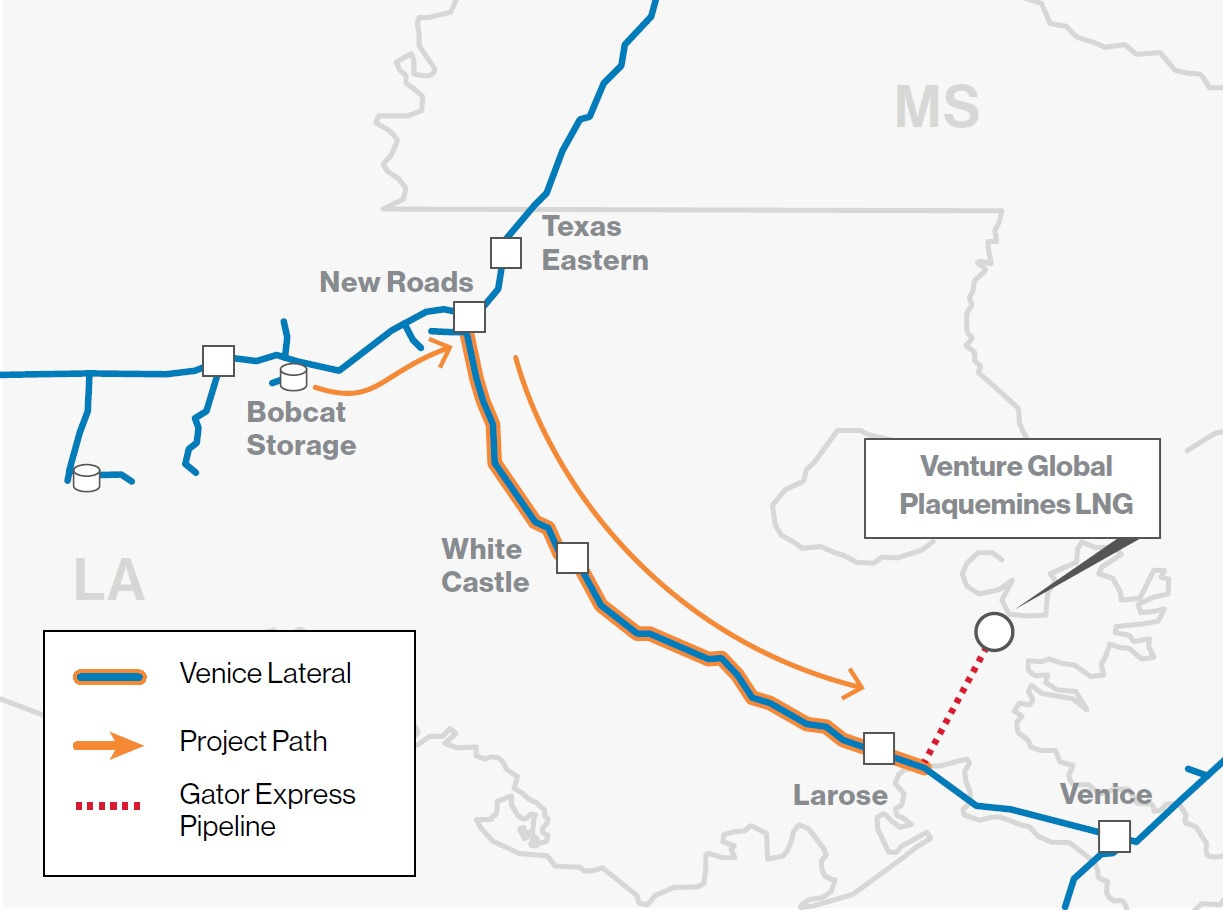
A trio of Federal Energy Regulatory Commission authorizations in the latter half of December allowed new LNG trains to begin operations or boosted gas supplies to the facilities. (Source: NLM Photo / Shutterstock.com)
As the year ended, two major projects at Corpus Christi and Plaquemines made headlines by firing up LNG production. After two years, the U.S. expanded its LNG production capacity and boosted the demand for natural gas, despite a year in which the industry faced regulatory uncertainty from the Biden administration.
But in the last weeks of December, the Federal Energy Regulatory Commission (FERC) made a flurry of authorizations in support of those projects.
The Venice Pipeline Extension
FERC authorized Enbridge on Dec. 26 to begin full service on a 1.26-Bcf/d line that will ship natural gas to a newly opened Plaquemines LNG facility in Louisiana operated by Venture Global LNG.
Texas Eastern Transmission, a subsidiary of Enbridge, began an expansion of the Venice Pipeline in 2022. In the project, a 2.2-mile segment in southeastern Louisiana was abandoned and replaced by a three-mile segment and new compressor station in Pointe Coupee Parish, Louisiana.
Canada-based Enbridge also replaced two other compression stations as part of the project.
The line has been partially in-service going back at least to Nov. 1, when the company announced it was shipping about 800 MMcf/d of natural gas on a third-quarter conference call.
The FERC’s authorization granted Texas Eastern permission to turn on the last two 31,900 hp compressor stations on the line, allowing it to reach full capacity.
Enbridge’s Venice Extension is half of a two-part project announced in 2022. In tandem with the Venice Extension, the company also announced the pending construction of the Gator Express Meter Project, which tied the Venice line directly into Plaquemines in 2023. Enbridge estimated the cost of the overall project at $400 million. The company did not immediately respond to requests for comment on Dec. 31.

Plaquemines Block 4
Thirteen days after announcing the start of production at Plaquemines LNG, Venture Global shipped the plant’s first cargo on Dec. 26 to a customer in Germany.
The company’s latest FERC authorization indicates the facility’s expansion plans will continue.
On Dec. 23, the FERC authorized Venture Global to introduce hazardous fluids into Plaquemines Liquefication Train System (LTS) Block 4. “Hazardous fluids” indicates feedgas, according to the FERC letter.
It’s the fourth LTS system to start flowing. Plaquemines has 18 LTS blocks, each with two liquefication trains with a nameplate capacity of about 1.1 million metric tons a year (mtpa), meaning each could process about 144.8 MMcf/d of natural gas. When complete, Venture Global expects the facility to have a peak LNG production capacity of 27.2 mtpa, according to the company’s SEC filing.
In the filing, Venture Global indicated the Plaquemines commissioning process could take up to two years, during which time the company would continue to sell and keep the proceeds of LNG cargoes. The company followed the same policy at its earlier Calcasieu Pass plant and is currently undergoing arbitration with investors.
RELATED
Venture Global LNG Files Paperwork for IPO
Corpus Christi Train 1 - String 1
FERC’s final authorization of 2024 allowed for the production start of Cheniere’s Corpus Christi LNG Phase 3.
The FERC permit issued on Dec. 23 gave the company the green light to introduce gas and refrigerants into the facility’s Train 1–String 1 (called the “cold” end) to begin LNG production.
The company announced a week later that LNG production was underway. The commissioning process will continue into 2025. The overall Phase 3 project will boost production at the site by 10 mtpa.
Overall, Houston-based Cheniere expects to produce 47 mtpa to 48 mtpa of LNG at its Corpus Christi and Sabine Pass facilities in 2025, the company told investors at its more recent quarterly meeting.
Recommended Reading
E&P Highlights: Dec. 16, 2024
2024-12-16 - Here’s a roundup of the latest E&P headlines, including a pair of contracts awarded offshore Brazil, development progress in the Tishomingo Field in Oklahoma and a partnership that will deploy advanced electric simul-frac fleets across the Permian Basin.
Wildcatting is Back: The New Lower 48 Oil Plays
2024-12-15 - Operators wanting to grow oil inventory organically are finding promising potential as modern drilling and completion costs have dropped while adding inventory via M&A is increasingly costly.
E&P Highlights: Jan. 6, 2025
2025-01-06 - Here’s a roundup of the latest E&P headlines, including company resignations and promotions and the acquisition of an oilfield service and supply company.
Analysis: Middle Three Forks Bench Holds Vast Untapped Oil Potential
2025-01-07 - Williston Basin operators have mostly landed laterals in the shallower upper Three Forks bench. But the deeper middle Three Forks contains hundreds of millions of barrels of oil yet to be recovered, North Dakota state researchers report.
E&Ps Pivot from the Pricey Permian
2025-02-01 - SM Energy, Ovintiv and Devon Energy were rumored to be hunting for Permian M&A—but they ultimately inked deals in cheaper basins. Experts say it’s a trend to watch as producers shrug off high Permian prices for runway in the Williston, Eagle Ford, the Uinta and the Montney.
Comments
Add new comment
This conversation is moderated according to Hart Energy community rules. Please read the rules before joining the discussion. If you’re experiencing any technical problems, please contact our customer care team.






